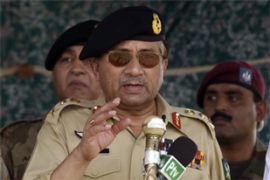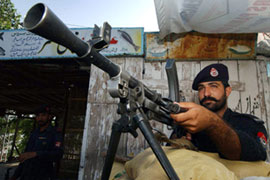Pakistan confusion over emergency
Officials make contradictory remarks on its imposition amid speculation.

Published On 9 Aug 2007
Chaudhry Shujaat Hussain, the president of Pakistan Muslim League, however, told reporters at parliament: “There is no possibility of an emergency.”
A senior government official who requested anonymity said Musharraf had already held several meetings on Wednesday with Shaukat Aziz, the prime minister, legal experts and senior members of the ruling party.
Tariq Azim, the minister of state for information, said a state of emergency was being discussed because of “some external and internal threats and the law and order situation”.
During a state of emergency, the government can restrict the freedom to move, rally, engage in political activities or form groups as well as take a slew of other measures, including restricting the parliament’s right to make laws.
It can even dissolve parliament.
Under Pakistan’s constitution, the president may declare a state of emergency if it is deemed that the country’s security is “threatened by war or external aggression, or by internal disturbance beyond” the government’s authority to control.
If a state of emergency is to be extended beyond two months, it must be approved by a joint sitting of parliament, the constitution says.
Kamal Hyder, Al Jazeera’s correspondent in Pakistan, said the state of emergency would give the government greater control and suspend rights such as to free speech.
No show
 |
| State of emergency will give the government greater control and suspend rights [AFP] |
Earlier on Wednesday, Musharraf pulled out of a peace meeting with tribal elders in Afghanistan.
The president told Hamid Karzai, his Afghan counterpart, that he would send his prime minister in his place.
The council meeting was to start on Thursday and had been brokered by the US president.
A US state department official speaking on condition of anonymity initially said the Bush administration was surprised and dismayed by Musharraf’s pullout.
But Sean McCormack, the department’s spokesman, later said: “President Musharraf certainly wouldn’t stay back in Islamabad if he didn’t believe he had good and compelling reasons to stay back. Certainly we would understand that.”
Source: Al Jazeera, News Agencies